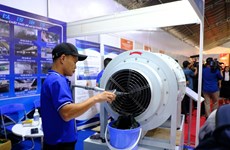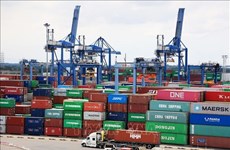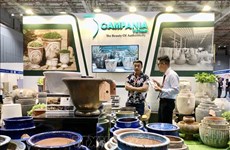GMC finds niche in local market
While Vietnam remains careful with local cultivation of genetically
modified crops (GMC), a large number of these products are already
available on the local market.
While Vietnam remains careful with local cultivation of genetically
modified crops (GMC), a large number of these products are already
available on the local market.
Whether Vietnamese like it or not, they are consuming GMC products, said Professor Nguyen Lan Dung, general secretary of the Vietnam Microbiology Association.
Vietnam imports over 2 million tonnes of soybean oil-cake and 1.6 tonnes of maize annually, most of which are products of GMC technology, he said.
Many scientists at a seminar on developing GMCs held in October in Hanoi confirmed that most animal feed contains genetically modified maize and soybeans.
Chairman of the Crop Variety Association Tran Dinh Long cited a survey conducted in 2007 showing that most samples of animal feed sold in the local market did indeed contain GMCs.
The survey said some varieties of GMC maize had been planted in combination with normal maize in HCM City and in the two southern provinces of Dong Nai and Binh Duong.
Nearly all cotton grown in Vietnam is genetically modified, experts said.
Deputy Minister of Agriculture and Rural Development Bui Ba Bong said large-scale cultivation of genetically modified maize will start as early as next year.
GMCs are able to withstand the harsh weather conditions caused by climate change, he said.
Professor Dung said the use of GMCs is indispensable for the country as agriculture is its mainstay with over 70 percent of population being farmers.
He emphasised the need for Vietnam to choose a suitable path in the context of its low level of science and technology, and pointed out the cultivation of GM maize in Vinh Phuc, Dak Lak, Nghe An and Dong Nai provinces, where productivity is between 17 percent and 35 percent higher than that of traditional maize.
It will be worth cultivating if the productivity is at least two times higher, he said.
While developed countries are spending more on developing GMC technology, Vietnam is strictly monitoring GM crops and trees to ensure everything is safe.
“Wide-spread cultivation of GM crops offers benefits but also presents challenges, particularly in Vietnam where they were only recently introduced,” Bong said, adding that the planting of GM crops will closely monitored.
He said the ministry will only allow the cultivation of GM maize, soybeans and cotton in the short term, with priority given to maize.
GMCs can help local agriculture develop faster, but mistakes cannot be fixed if they occur, he said.
Throughout the world, only 29 countries cultivate GMCs on a large scale since the first GM seedling was grown about 15 years ago.
Genetically Modified Organisms (GMO) are organisms whose genetic material has been altered using genetic engineering techniques. These techniques, generally known as recombinant DNA technology, use DNA molecules from different sources, which are combined into one molecule to create a new set of genes. This DNA is then transferred into an organism, giving it modified or novel genes. Transgenic organisms, a subset of GMOs, are organisms which have inserted DNA that originated in a different species./.
Whether Vietnamese like it or not, they are consuming GMC products, said Professor Nguyen Lan Dung, general secretary of the Vietnam Microbiology Association.
Vietnam imports over 2 million tonnes of soybean oil-cake and 1.6 tonnes of maize annually, most of which are products of GMC technology, he said.
Many scientists at a seminar on developing GMCs held in October in Hanoi confirmed that most animal feed contains genetically modified maize and soybeans.
Chairman of the Crop Variety Association Tran Dinh Long cited a survey conducted in 2007 showing that most samples of animal feed sold in the local market did indeed contain GMCs.
The survey said some varieties of GMC maize had been planted in combination with normal maize in HCM City and in the two southern provinces of Dong Nai and Binh Duong.
Nearly all cotton grown in Vietnam is genetically modified, experts said.
Deputy Minister of Agriculture and Rural Development Bui Ba Bong said large-scale cultivation of genetically modified maize will start as early as next year.
GMCs are able to withstand the harsh weather conditions caused by climate change, he said.
Professor Dung said the use of GMCs is indispensable for the country as agriculture is its mainstay with over 70 percent of population being farmers.
He emphasised the need for Vietnam to choose a suitable path in the context of its low level of science and technology, and pointed out the cultivation of GM maize in Vinh Phuc, Dak Lak, Nghe An and Dong Nai provinces, where productivity is between 17 percent and 35 percent higher than that of traditional maize.
It will be worth cultivating if the productivity is at least two times higher, he said.
While developed countries are spending more on developing GMC technology, Vietnam is strictly monitoring GM crops and trees to ensure everything is safe.
“Wide-spread cultivation of GM crops offers benefits but also presents challenges, particularly in Vietnam where they were only recently introduced,” Bong said, adding that the planting of GM crops will closely monitored.
He said the ministry will only allow the cultivation of GM maize, soybeans and cotton in the short term, with priority given to maize.
GMCs can help local agriculture develop faster, but mistakes cannot be fixed if they occur, he said.
Throughout the world, only 29 countries cultivate GMCs on a large scale since the first GM seedling was grown about 15 years ago.
Genetically Modified Organisms (GMO) are organisms whose genetic material has been altered using genetic engineering techniques. These techniques, generally known as recombinant DNA technology, use DNA molecules from different sources, which are combined into one molecule to create a new set of genes. This DNA is then transferred into an organism, giving it modified or novel genes. Transgenic organisms, a subset of GMOs, are organisms which have inserted DNA that originated in a different species./.













